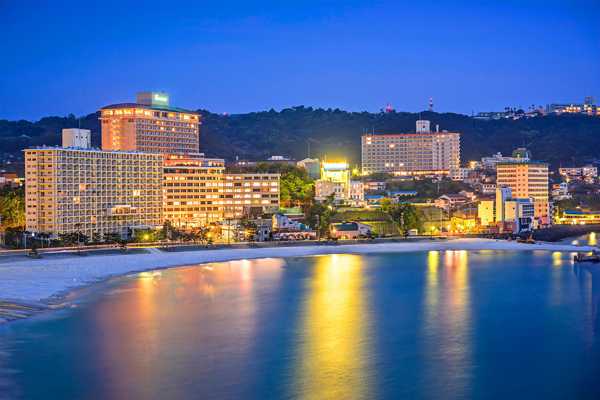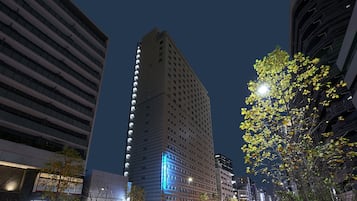It's time to leave the train and car behind and take a hike, which is a great way to enjoy the Japanese scenery from a different perspective. In fact, walking is probably the best option if you want a close-up experience of Japan's nature, history and culture. Make a detour or take a break and you're likely to discover spectacular spots and exquisite gourmet food in unexpected places. These places off the beaten track, which aren't listed in guidebooks, are also where you'll find the best opportunities to interact with the locals and build some great summer memories.
- 1
Yakushima
Find a moss-covered world in the ancient forest of Yakushima

- Aventuras
- Asequible
- Parejas
- Familias
- Historia
- Fotos
Located at the southernmost tip of mainland Japan, 60 kilometres south of Cape Sata in Kagoshima Prefecture, Yakushima is a World Heritage Site thanks to its rich ecosystem. The 22-kilometre, 10-hour hiking course overlooking the island's giant tree, Jomon Sugi, has water and toilets along the way, so it's a safe route even if you're a beginner. In Shiratani Unsuikyo, head to the Taikoiwa observation point for some stunning views. The mossy virgin forest, which was adopted as the setting for the Ghibli film Princess Mononoke, is a sight for sore eyes and is full of refreshing air to breathe. On top of that, this forest is only 10 kilometres from downtown Miyanoura, which is another reason for its popularity.
Dirección: Yakushima Town, Kumage District, Kagoshima Prefecture, Japan
Mapa - 2
Oze National Park
Oze's skunk cabbage flowers are summer itself

- Aventuras
- Asequible
- Parejas
- Familias
- Historia
- Fotos
Oze has long been familiar to Japanese people because it appears in the lyrics of the famous song "Summer Memories". Here you'll find animals such as Asiatic black bears and Japanese serows as well as many plant varieties that are peculiar to wetlands. There are glorious fields of flowers spreading out across the mountain trail of Mt. Kasagatake as well as rare serpentine plants on Mt. Shibutsu, where you can see Ozegahara from the summit. You'll find Narthecium asiaticum growing on Ayamedaira Marsh, which is just over 5 hours away from the entrance to Hatomachi Pass. Particularly famous here is the skunk cabbage, which comes into full bloom in mid-May. Check it out from the wooden path that runs through Ozegahara.
Dirección: Katashina Village, Tone District, Gunma Prefecture 378-0411, Japan
Mapa - 3
Mount Fuji
The World Heritage Site of Mt. Fuji is much more than a climbing experience

- Aventuras
- Asequible
- Parejas
- Familias
- Historia
- Fotos
Mt. Fuji, which has been registered as a World Heritage Site, is one of those mountains that most Japanese people hope to climb at least once in their lifetime. There are four mountain trails - Yoshida, Subashiri, Gotemba and Fujinomiya - and the Yoshida route, which has a good number of mountain lodges, is especially popular for beginners. The shortest distance to the summit is via the Fujinomiya route, which also offers sea views. There are also plenty of hiking trails around Mt. Gangaharasuriyama, Mt. Nakato and The Five Lakes of Mt. Fuji from which you can see the entirety of Mt. Fuji. There are campsites too, so you can break up your hiking adventure by sleeping along the way.
Dirección: Kitayama, Fujinomiya City, Shizuoka Prefecture 418-0112, Japan
Mapa - 4
Kumano Kodo
Walk the Kumano Kodo to enjoy silence in an ancient Japanese power spot

- Aventuras
- Asequible
- Parejas
- Familias
- Historia
- Fotos
If you set out walking towards Kumano Hongu Taisha, you'll be following in the footsteps of many people from centuries gone by, from noble people of the Heian period to the common people of Edo. Head through the shrine gate and look up at the main shrine building for an impressive view of Japan's long history. Yhe old road from Prince Hosshinmon through the village is a popular hiking route. There's something quite nostalgic about the scenery of the fields here. On the route that departs from Kobiro-oji, you'll see the beautiful sights of Nakahechi on the Kumano Kodo as you progress through three perilous passes in the forest: Waraji Pass, Iwagami Pass, and Mitsukoshi Pass. After a good day's walking, why not recuperate at the Hongu Onsenkyo hot spring village?
Dirección: 1110 Hongu, Hongu-cho, Tanabe-shi, Wakayama 647-1731, Japan
Mapa - 5
Shikoku 88 Pilgrimage Sites
Enjoy a trip of reflection on the Shikoku pilgrimage route

- Aventuras
- Asequible
- Historia
- Fotos
There are many pilgrimage routes in the world, and Japan has its own pilgrimage routes that continue to this day in Shikoku. The 88 pilgrimage sites are places where the teachings of Kobo Daishi are brought into the present. The entire journey of the Shikoku pilgrimage from the 1st to the 88th site covers about 1,400 kilometres, and it'll take you anywhere from 6 weeks to 2 months to complete the whole route in one go. It's probably best not to overdo it, so maybe consider using public transportation or switching to a bicycle rental at points. Using the temple lodgings reserved for pilgrims is also an experience unique to the Shikoku pilgrimage. Just make sure that you respect the etiquette here and keep a humble attitude.
Dirección: 126 Bando Tsukahana, Oasa-cho, Naruto City, Tokushima Prefecture 779-0230, Japan
Mapa - 6
Mount Takao
A standard day hike that's easily accessible from the city centre

- Aventuras
- Asequible
- Parejas
- Familias
- Historia
- Fotos
A familiar face to the citizens of Tokyo, Mt. Takao stands 599 metres tall and has many hiking trails covered in a natural environment that changes throughout the seasons. The main route, Route 1, is full of highlights. From Kinpiradai, you can see out towards Shinjuku. You can ascend halfway by cable car or lift, which is convenient for using the toilet, taking a break, and eating. The approach to Yakuouin is paved, and it takes about 30 minutes to get from there to the summit. Once you're at the top, you can enjoy great views of Mt. Fuji when the air is clear.
Dirección: Takaomachi, Hachioji City, Tokyo 193-0844, Japan
Mapa - 7
Shiretoko
Take a hike around the lake to experience the power of Hokkaido's nature

- Aventuras
- Asequible
- Parejas
- Familias
- Historia
- Fotos
The Shiretoko Peninsula area in eastern Hokkaido, where you can experience drift ice and watch wild animals, has become a World Natural Heritage Site and is visited by a large number of tourists from Japan and abroad. The Shiretoko Goko Lakes are particularly popular, featuring hiking routes and an elevated boardwalk that provides a 1.6-kilometre loop that takes about 40 minutes to walk. This site is open all year round and is free of charge. There's a promenade through the primeval forest that has a large loop of 3 kilometres and a smaller loop of 1.6 kilometres, which can be accessed through paid tours. There are also some great places to visit by hiking, such as Shiretoko Pass, which overlooks Kunashiri Island in the Northern Territories, and Furepe Falls, also known as "The Maiden's Tears".
Dirección: Onnebetsumura, Shari-cho, Shari-gun, Hokkaido 099-4356, Japan
Mapa - 8
Nakasendo
Travel back in time to a post town on the highway connecting Edo and Kyoto

- Aventuras
- Asequible
- Parejas
- Familias
- Historia
- Fotos
Since being featured in the Lonely Planet guide, the Nakasendo highway has become a popular destination for people from other countries. For a good taste of the Edo period highway atmosphere, check out Magome-juku in Gifu Prefecture, where there are still old folk houses like those seen in ukiyo-e with cobblestones. From here the Nakasendo hiking route goes through the perilous Magome Pass to Tsumago-juku in Nagano Prefecture, which is about 2 hours away. You'll also find some exceptional views of waterfalls along the way. Don't forget to grab some local goheimochi skewered rice cakes for the journey. Also worth checking out is the Ochiai-juku hiking trail that goes from Ochiai-juku to Magome-juku and crosses the Tokuma Pass, which is known as a tricky part of the Kisoji section of the Nakasendo.
Dirección: Nakatsugawa City, Gifu Prefecture 508-0502, Japan
Mapa - 9
Hakuba Valley
Ski or hike around Hakuba in Japan's Northern Alps

- Aventuras
- Asequible
- Parejas
- Familias
- Fotos
Happoone Nature Research Road is the royal road for hiking at the foot of Mt. Hakuba. From the foot of the mountain, transfer to a gondola or lift before walking about 90 minutes on foot to get to the destination: Happo Pond. The view of the pond surrounded by the majestic Northern Alps reflecting on the surface of the water is simply stunning. In June and July, beautiful primulas bloom as far as the eye can see. This is one of the highlights of sightseeing in Happoone. A mountain climbing trail of about 2 and a half hours continues on to Karamatsudake. With facilities from the Nagano Olympics and eateries located around the gondola and lift platform, this is a convenient as well as beautiful place to visit.
Dirección: Hokujo, Hakuba-mura, Kitaazumi-gun, Nagano Prefecture 399-9301, Japan
Mapa - 10
Asahidake
View the spectacular scenery of alpine plants at Hokkaido's highest peak

- Aventuras
- Asequible
- Parejas
- Familias
- Fotos
Take the Asahidake Ropeway (accessible from Asahikawa Station in and Asahikawa Airport) for about 10 minutes, and enjoy a hike for about an hour from there. Asahidake is crowded with climbers during the summer season from June to September. The beautiful scenery of the autumn leaves that cover the mountains make this a popular getaway destination in the Japanese public holidays at the end of September. And if you're looking for a hot springs, there's Asahidake Onsen too. Asahidake stands at 2,291 metres above sea level and is home to a huge diversity of alpine plants. The views from Sugatami no Ike ("the mirror pond") and the observatory, which is a 20 to 30-minute walk from the ropeway station, are also must-sees.
Dirección: Nokanan, Higashikawa-cho, Kamikawa-gun, Hokkaido 071-1471, Japan
Mapa


















